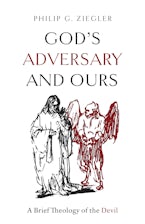In this little but impactful book, Phil Ziegler continues his trailblazing into a salient contemporary dogmatics of the apocalyptic gospel. He does so by daring to articulate an urgently needed but also carefully nuanced doctrine of the foe of God – the God whose end for the creation, breaking into the world in the event of Christ and its proclamation, is its redemption to righteousness, life, and peace. The deconstruction of the classical account of the devil as the fallen angel Lucifer for backing an implausible theodicy is alone worth the read. Even more impressive, however, is his better account of the evil one, known strictly as the adversary of Christ in the very process of its defeat in principle, if not yet fully in power.
~Paul R. Hinlicky, Distinguished Professor and Research Fellow, Christ Seminary of the Institute of Lutheran Theology
This is a brilliant book. Coming from the Reformed tradition, which has often been hesitant to discuss the devil, Phil Ziegler relocates the theology of the devil in the second article instead of the first: the devil is Christ’s adversary rather than a creature gone wrong. This recalibration evidently fits the biblical witness better than the traditional approach did. Ziegler retrieves the language of cosmic battle in the synoptic gospels, shedding fresh light on Jesus Christ as the Way, Truth and Life along the way. The readable, often humorous, style matches the content: while ultimate evil is very serious, Christ’s victory puts it in perspective. This book is a fine example of the creative power of systematic theological thinking. It is a must-read for all who are interested in the power of evil--and Christ’s victory over it.
~Arnold Huijgen, Professor of Dogmatics, Protestant Theological University, Utrecht, The Netherlands
Baptismal vows frequently include the renunciation of the devil, but Christian reflection on that figure often begins and ends there. In these pages Philip Ziegler discloses the necessity of taking the devil seriously in any account of salvation. His proposal is as well-informed by the Gospels and the theological tradition as it is urgently needed. God’s Adversary and Ours is a major contribution.
~Beverly Roberts Gaventa, Helen H.P. Manson Professor of New Testament Literature and Exegesis Emerita, Princeton Theological Seminary
This book is at once daring and necessary. It confronts an aspect of the Scriptural witness that has been suppressed within large parts of the tradition, and the Reformed tradition in particular: the presence and activity of the devil. In doing so it invites a profound rethinking of the traditional Christian landscape and our place within it. Critiquing the domestication of the devil under the auspices of the doctrine of providence, Ziegler calls us from a cool, third person stance towards evil to a first person resistance of the devil in the prayerful working out of our salvation. This call entails, moreover, a radical recasting of the role of doctrine more broadly.
~Susannah Ticciati, Professor of Christian Doctrine, King’s College London
Christian thinking about the devil can range from the wacky to the waved-by. Is there any purpose or promise in writing a responsible diabology? Emphatically, yes, says Philip Ziegler! Clarity about the nature of the good news demands it. The gospel proclaims that Jesus is the way, the life, and the truth, but a powerful adversary opposes Jesus and his mission with temptation, oppression, and falsehood. Central to the good news of God's redemption is Jesus's struggle with and final defeat of God's adversary and ours, the devil. With wit, wisdom, and winsomeness, Ziegler has given us a book on the devil destined to become a classic.
~Douglas Harink, Professor Emeritus of Theology, The King’s University, Edmonton
Although the subject of the devil is widely neglected in modern theology, our culture continues to adopt the concept of the demonic in the face of grotesque manifestations of evil. Philip Ziegler’s perceptive study offers a constructive though chastened theological account of such language. As a vital 'ontological metaphor,' discourse about the diabolic cannot be avoided, he argues, if we are to sustain an adequate account of redemption, sin and evil. This is likely to prove the most important work on the subject in a long time.
~David Fergusson, Regius Professor of Divinity, University of Cambridge

